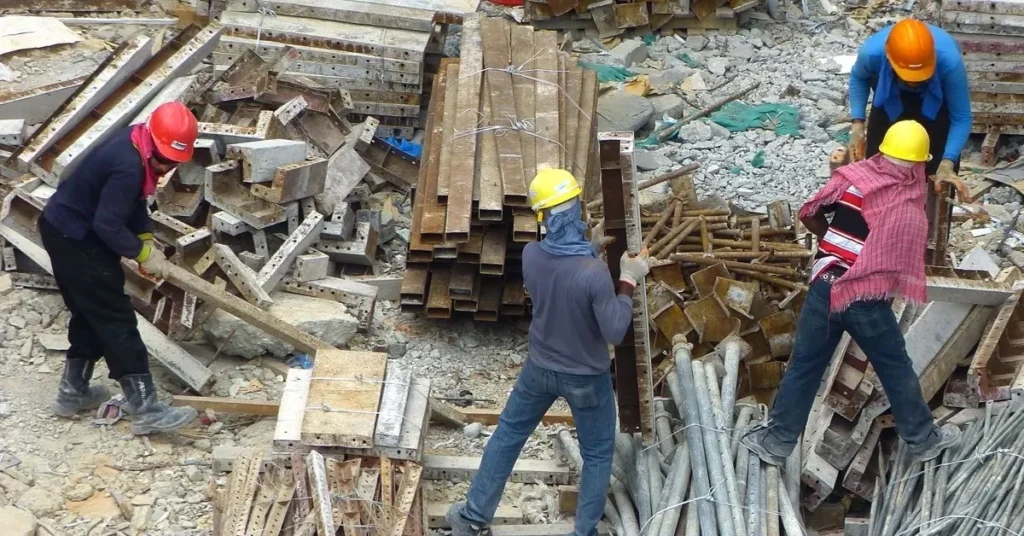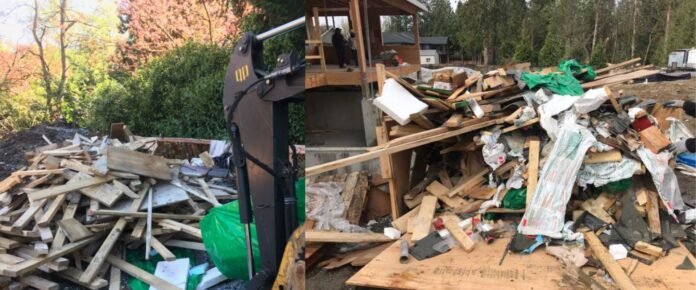When it comes to home renovation or construction, one of the often-overlooked aspects is the removal of debris. Residential construction debris removal is essential for maintaining a safe and clean environment during and after a project. This guide will explore the importance, methods, and best practices for effective debris removal.
What is Residential Construction Debris?
Types of Construction Debris
Residential construction debris includes all the waste generated from building, remodeling, or demolition activities. Common types of debris include:
- Wood: Leftover framing materials, plywood, and other wooden products.
- Drywall: Pieces of gypsum board that are often cut and discarded during interior construction.
- Concrete: Waste from demolition or renovation that includes chunks of concrete and masonry.
- Metal: Scrap metal from pipes, fittings, and other structural components.
- Glass: Broken windows and glass from doors and other fixtures.
- Insulation: Old insulation materials being removed during renovations.

Importance of Debris Removal
Proper residential construction debris removal is crucial for several reasons:
- Safety: Construction sites can pose safety hazards. Removing debris reduces the risk of accidents, such as tripping or falling.
- Health: Dust and debris can affect air quality, leading to respiratory issues. Effective removal ensures a healthier environment for residents.
- Aesthetics: A clean site is visually appealing and promotes a positive image of the construction project.
- Efficiency: A cluttered work area can slow down progress. Removing debris allows workers to operate more efficiently.
Methods of Debris Removal
DIY Debris Removal
For smaller projects, homeowners may consider DIY methods for debris removal. Here are some effective strategies:
Renting a Dumpster
One of the most efficient ways to manage debris is by renting a dumpster. This option allows you to:
- Choose the Size: Dumpsters come in various sizes, so you can select one that fits your project needs.
- Convenience: A dumpster on-site makes it easy to dispose of debris as you work.
- Schedule Pickup: Most rental companies offer flexible pickup options, ensuring your debris is removed promptly.
Sorting Debris
Sorting debris into recyclable and non-recyclable categories can minimize landfill waste. Common recyclable materials include:
- Metal: Often accepted at scrap metal yards.
- Wood: Some facilities will recycle untreated wood.
- Drywall: Certain recycling centers accept drywall for reuse.
Hiring a Professional Service
For larger projects, hiring a professional residential construction debris removal service may be the best option. These services offer numerous advantages:
Expertise
Professionals have experience handling various types of debris and know how to dispose of it safely and legally. They are also aware of local regulations regarding waste disposal.
Efficiency
A dedicated team can complete the job faster than a DIY approach. They have the right equipment and manpower to handle large amounts of debris swiftly.
Comprehensive Services
Many debris removal companies provide additional services, such as:
- Clean-Up: Clearing the site of all debris, leaving it ready for the next phase of construction.
- Recycling: Many professionals will sort materials and recycle what they can, minimizing environmental impact.
Best Practices for Debris Removal
Plan Ahead
Proper planning can streamline the debris removal process:
Assess Your Needs
Before starting a project, evaluate the amount and type of debris you expect to generate. This assessment will help you choose the right removal method.
Budget for Removal
Include debris removal costs in your overall project budget. Whether renting a dumpster or hiring a service, knowing the costs upfront can prevent unexpected expenses.
Follow Local Regulations
Each locality may have specific regulations regarding construction debris disposal. Be sure to:
- Research Guidelines: Familiarize yourself with local waste disposal laws to ensure compliance.
- Use Licensed Services: If hiring a company, ensure they are licensed and familiar with local regulations.
Safety First
Safety should always be a priority during debris removal. Consider the following:
Personal Protective Equipment (PPE)
When handling debris, wear appropriate PPE, including:
- Gloves: To protect your hands from sharp edges and splinters.
- Safety Glasses: To shield your eyes from dust and debris.
- Dust Masks: To prevent inhalation of harmful particles.
Proper Lifting Techniques
When manually lifting heavy items, always use proper techniques to avoid injury:
- Lift with Your Legs: Bend your knees and keep your back straight.
- Get Help: For larger items, don’t hesitate to ask for assistance.
Environmental Considerations
Reducing Waste
In today’s eco-conscious world, reducing waste is more important than ever. Consider the following strategies:
Reuse Materials
Whenever possible, try to reuse materials from your project. This not only reduces waste but can also save you money.
Donate Usable Items
Items in good condition, such as cabinets or fixtures, can often be donated to charities or resale shops.
Recycling Programs
Take advantage of local recycling programs. Many communities have specific guidelines for recycling construction materials, which can significantly reduce landfill waste.
Conclusion
Residential construction debris removal is a vital aspect of any renovation or building project. Whether you choose to manage debris yourself or hire professionals, understanding the methods and best practices for removal can lead to a cleaner, safer, and more efficient construction experience. Always prioritize safety, plan ahead, and consider the environmental impact of your debris disposal choices. By following these guidelines, you can ensure your project proceeds smoothly, leaving you with a beautiful, clean home.

